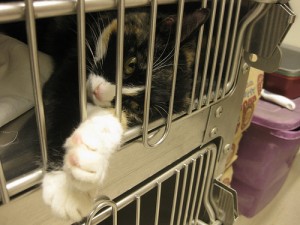Should I Choose a Dog or a Cat as a Pet?
June 13, 2010 by LaBecs
Filed under Should I choose a dog or a cat as a pet?
You want to adopt a pet, but how do you decide if you want a dog or a cat? Well, the obvious answer lies within you: are you a “dog person”, or a “cat person”? Most people already know this, but if you really never thought about it, let’s see what advantages or disadvantages each species has to help you decide.
Cats and dogs have different needs and characteristics. One thing that applies to both is that they all need attention, you need to budget for their veterinary care, food and emergencies, you need to clean after them, and you have to love them unconditionally.
Now, for the differences.
Dogs:
Your lifestyle will definitely determine if you should have a dog or a cat as a pet. If you like to travel a lot, or work all day, a dog is not for you.
-Different breeds have different characteristics, you should choose one that matches your personality and lifestyle.
-If you travel, boarding a dog is quite expensive.
-A dog needs company and attention. If you have a dog and leave him home alone all day, you will have a very unhappy pet.
-Dogs need exercise. More or less depending on the breed.
-You need to walk them at least a couple of times daily for them to do “their thing”.
-Dogs need to be trained, socialized and housebroken.
-Dogs like to play. They need to be stimulated and love to play with their masters.
-Some dogs shed a lot. You have to be prepared to clean after them constantly.
 -Dogs need to be groomed often. You need to brush their coat, bathe them, and brush their teeth.
-Dogs need to be groomed often. You need to brush their coat, bathe them, and brush their teeth.
-A small dog is a little easier to take care of, but it still needs walks, play and attention. A big dog obviously needs more space.
-A small dog eats very little, but a big dog will eat a lot. You have to be ready for the expense of feeding.
-Dogs love to ride in the car and go hiking, swimming and all kinds of outdoor activities.
-A dog will greet you happily every time you come home, he will want to sleep with you, and in general, share everything with you.
-There are many dog parks where you can take your pet to run and play.
-Dogs are protective of their humans and will be faithful forever.
Cats:
If you work outside your home or travel a lot, and the pet needs to be alone for many ours, a cat might be for you.
-If you travel, boarding a cat is not as expensive, depending on the facility. They could be left at home with a pet sitter visiting once or twice a day.
-All cats have different personalities. Some are affectionate lap cats, and others are more energetic and don’t like to be petted as much. Choose carefully.
-A cat can be left alone to sleep most of the day.
-Cats are independent, but that does not mean you can live them alone all day and not pay any attention to them. They do love company.
 -Cats need to play and be stimulated. They entertain themselves more easily without being destructive.
-Cats need to play and be stimulated. They entertain themselves more easily without being destructive.
-Cats are very easily trained to use their litter box, which requires cleaning at least once a day.
-There’s no need to walk them, though some cats like to walk on a leash.
-Some cats are easily trained to do tricks. Some are very good at fetching.
-Cats eat very little depending on their size, but never as much as a dog.
-Cats don’t need to be bathed, but they do need to get brushed and you need to brush their teeth regularly.
-You can get a cat used to car rides, but they mostly prefer to stay at home.
-Cats can live in small apartments. It’s actually better to always keep them indoors.
-Contrary to popular belief, cats will greet you at the door and follow you around like a dog.
-Cats are playful and a delight to watch as they jump and run and chase.
-You need to have space for a litter box in a well ventilated area, away from kids and out of site.
-Cats like to have scratching posts or kitty condos.
-Cats love to cuddle.
-Cats can be very protective of their humans and will be faithful forever. They do get attached to their owners.
I am one of those strange people that is a cat person and a dog person. I love them both with all my heart and enjoy their different personality traits. I have never had two cats with the same personality, it’s always an adventure to get to know them. And dogs for me, are the best company you can ever ask for. But one thing is certain, both species are incredible, and everybody should have the experience of living with one or both of them at some point.
Why Does a Cat Stop Using the Litter Box?
June 29, 2009 by LaBecs
Filed under Why Does a Cat Stop Using the Litter Box?
While cleaning out the litter box is not a wonderful chore that anyone enjoys, it is a necessity for your cat. This is, after all, your cat’s bathroom area and cats have a tendency to be very fastidious. If your cat suddenly starts having litter box problems and using the bathroom elsewhere, this might be a sign that you need to be cleaning that box more often. However, it can also be a sign of other problems, including serious medical conditions.
Reason #1: Busy Location
Cats are private animals. While a dog will do its business outside with everyone in the world watching and think nothing of it, cats have to relax in order to get the job done. If the litter box is located in an area where people are always coming and going, that’s going to be upsetting to your cat and he or she is likely to go elsewhere in the house, usually some place quiet like a corner.
Now, if you haven’t moved the litter box and if the traffic in the area hasn’t increased lately, but your cat has suddenly stopped using it, there’s probably another good reason.
Reason #2: Cat Preferences
Cats seem to be a lot pickier than dogs about everything from toys to food to sleeping locations. They are also sometimes very picky about their litter boxes. Many cats like certain types of litter better than others, possibly because of the way it feels on their paws. Other cats have litter box type preferences. While some love to have the covered boxes for more privacy, others prefer something that is a little more open so they can what is going on around them.
As with the first reason, if you haven’t made any changes that might upset your cat’s preference but he or she has suddenly stopped using the litter box, there is probably a different reason as the root cause.
Reason #3: Medical Problems
In some cases, a urinary infection or some other health problem can cause cats to have litter box problems. They may have a hard time going to the bathroom or may associate the litter box itself with discomfort which makes the box undesirable. If the sanitary reasons and the first two reasons don’t seem to explain the sudden change in your cat’s behavior, you should seek advice from a veterinarian immediately. Your cat might have a very serious health problem.
If you cat is defecating outside the litter box, he or she may have worms, gas, or other intestinal distress so a vet visit is definitely recommended. Remember that once your cat starts using the bathroom outside of the litter box, cleaning it with a solution that will destroy the enzymes in the urine or feces is essential. Otherwise your cat is going to continue to view that spot as an appropriate choice for going to the bathroom.

Amanda
Reason #4: Behavioral Problems
If you’ve ruled out all of the other reasons, you’ll have to start thinking like your cat and trying to pinpoint what may be the real problem. Anxiety can be one reason. A cat that doesn’t like to be left alone may use the bathroom outside the litter box as a sign of separation anxiety. A cat that’s angry because a new family member or pet has come into the picture may also start protesting by not using the litter box correctly.
When emotional issues are involved, you may find it harder to pinpoint the cause. However, you may be able to work with your vet on figuring out the best way to solve the problem so your cat can start using the litter box again and you can cut down on cleaning the carpet and other areas of your home.
Unfortunately, it’s very hard to fix a behavioral problem if you don’t know the exact cause. However, with patience and love, you might be able to find the cause and fix the problem. Sometimes medication can help. Do your research before taking any drastic measures. Always remember that no matter what he or she does, it’s not done to spite you. Cats are not capable of those ‘humanoid’ feelings. If your cat is having litter box problems, he doesn’t deserve to be punished or God forbid, euthanized, just because we don’t understand his reasons.
Good Reasons to Keep Your Cat Indoors
May 29, 2009 by LaBecs
Filed under Good Reasons to Keep Your Cat Indoors
For many cat owners, the choice of whether to keep their cat indoors or to let it roam free at least part of the time is difficult. Some cat lovers believe keeping your cat cooped up indoors all of the time amounts to cruelty. Other cat lovers argue that the dangers of allowing domesticated cats to run in the streets far outweighs any potential benefits for the cat. From the title of this piece, you can probably guess which side of the issue I’m going to side with. But I think it’s important for people to realize how dangerous things can be for cats on the streets.
The Disease Factor
Cats that spend even part of the time outside are at a significantly higher risk of catching one of the common feline diseases than those who live indoors. And don’t assume your cat is not at risk because he or she has been vaccinated. According to the Community Animal Welfare Society, most vaccines only provide up to 85% protection against these diseases so your cat is still a risk of becoming gravely ill.
Feline Leukemia is one of the most common diseases in cats and is transmitted through cat saliva, which means a stray cat that licks your roaming pet or a water source used by multiple cats can be a source of the disease. A second serious disease is Feline Immunodeficiency Virus (FIV). This disease is transmitted through cat blood so if your pet becomes involved in a fight with another cat while roaming outdoors he could contract the disease. Unfortunately, FIV is fatal and no cure is available at this time.
The Human Element
While cats do run a serious risk of catching disease from other felines outdoors, that’s not the only risk they face. Not everyone in your community is going to appreciate the activity of these free-roaming cats. A neighbor fed up with the cat’s visits to their yard, might deliberately leave out poisoned cat food or other dangerous things for cats. In other cases, toxic chemicals, such as those in antifreeze, are located in places where cats like to end up and can result in their death.
Humans can also be cruel. Around Halloween every year, hundreds of black cats are killed around the country in pranks. Cats that roam the streets are a very likely target for this type of behavior, especially since most owners let them out for the night when pranksters are most often on the prowl. They can also be caught and sold to research facilities, or taken to a shelter, where they will be euthanized in as little as 2 days if you don’t know he is lost.
Other Risks
Besides disease and human cruelty, roaming cats have other reasons to be afraid. They are an easy victim for dogs and other predators, and traffic. Who knows how many pets can be found flattened on the pavement every night. Cats can also be killed by cars in other ways since they like to sleep under them.

Build a Nice Outside Area
Cats that run in the neighborhood are also much more likely to contribute to the out-of-control cat population. Unless you have spayed or neutered your free roaming feline, you are undoubtedly adding to the problem. Too many cats are already euthanized daily because they do not have a proper home.
In some cases, very cruel owners will have their cats de-clawed but still allow them to roam the streets at night. This leaves the cat defenseless in the face of an attack. Not only can the cat not fight back against predators or other cats, but he or she cannot even scale a tree or a fence for protection from the attackers or from other threats.
The bottom line is that letting your cat outside provides no real benefits – only very real risks – to your cat’s health and safety. Don’t do it.
If you feel your cat is missing out, provide him with a good cat condo, if you lack the space you can always buy cheap Ikea shelves, glue on pieces of carpet that you can get as scrap at carpet places, and put them on the wall so your cat can climb up on the wall. They even look cool!
Give him or her a nice window seat to look out.
Teach them to walk on a leash. Yes they can be trained. They will initially feel confined by the harness, and their first attempts at walking on a leash might look uncomfortable and a waste of time, but with love and patience on your part, most cats will enjoy leash walking.
Build them an outdoor condo where they can come out and enjoy the sunshine if you have the space. You don’t have to spend a fortune.
Get them a mesh front carrier. Most are for dogs, but they can be used for cats as well. You can take them with you and go for walks, or get them a kitty stroller. You can get them at good prices online.
The point is, you can keep them safe and satisfied, and exercised, and they will never miss the great outdoors.
Top Ten Friendliest Cats
April 24, 2009 by LaBecs
Filed under Friendliest Cats
I think all cat owners have made this mistake: they go to the shelter or rescue and choose the cutest cat in the bunch, without even considering its temperament or personality. Then it turns out the cat ends up not being what they expected. Some are timid, some like to be petted and others don’t, others love to play, while others will hide under the bed all day. What are the friendliest cats? When you go to the shelter or rescue, always ask the people in charge what breeds the cats they have there resemble the most. They will almost always tell you, “This one has a little Ragdoll in it, this other has a bit of Maine Coon”, and many times you will find pure breeds that have been abandoned… so keep this list of the top ten friendliest cat breeds before you go to find the most wonderful treasure you will ever have.
Click on each picture to see their wonderful qualities:
(See below for a list of picture credits)
 #10 Chantilly-Tiffany |
 #9 Somali |
 #8 Ragdoll |
 #7 Persian |
 #6 Manx |
 #5 Maine Coon |

#4
Burmese |
 #3 Birman |
 #2 Exotic Short Hair |
 #1 Abyssinian |
CLICK HERE TO SEE THE FRIENDLIEST DOGS…
Photo Credits:
Persian Cat
Adopting from an Animal Shelter
March 13, 2009 by LaBecs
Filed under Adopting From an Animal Shelter
Animal shelters from your local Humane Society are your best source when looking for a cat or a dog to bring into your family. Not only do they have a great selection of adult animals for adoption, but they also have kittens and puppies, even purebred animals. On average, purebreds account for about 25 to 30 percent of a shelter’s dog population. So before you look for a dog or a cat for sale, go to the American Humane Society, and take the steps to adopt a dog, or a cat that really needs a home.
Many pets at your local shelter are waiting for new homes because they were obtained by someone with unrealistic expectations of the time, effort, and money required to sustain a lifelong relationship with their pet. National figures indicate that about half of the animals in shelters must be euthanized for lack of homes. Animals at your local shelter are eager to find a new home and are just waiting for someone like you.
You can depend on responsible shelters to assess the animals’ health and temperament in order to make the best adoption matches possible. When animals are relinquished by owners, the shelter staff makes every attempt to collect a thorough history of that pet. Then, while caring for animals, staff and volunteers try to learn as much as they can about these animals as well as those who come to the shelter as strays.
Don’t be discouraged if, when you first visit the shelter, there are no animals of the breed or type you want. Shelters receive new animals every day.
 Your shelter may also have a waiting list and can call you when an animal matching your preference becomes
Your shelter may also have a waiting list and can call you when an animal matching your preference becomes  available. Before choosing your pet, you can even speak with an adoption counselor about whether your choice of a particular type or breed will be best for you. In an effort to make good matches between people and animals and to place pets in lifelong homes, many shelters provide adoption counseling and follow-up assistance, such as pet parenting and dog-training classes, medical services, and behavior counseling. Or they may be able to refer you to providers of these services.
available. Before choosing your pet, you can even speak with an adoption counselor about whether your choice of a particular type or breed will be best for you. In an effort to make good matches between people and animals and to place pets in lifelong homes, many shelters provide adoption counseling and follow-up assistance, such as pet parenting and dog-training classes, medical services, and behavior counseling. Or they may be able to refer you to providers of these services.
Another advantage is that shelter adoption fees are usually much less than an animal’s purchase price at a pet store or breeder. And your new pet is more likely to be vaccinated, dewormed, and spayed or neutered.
To locate your local animal shelter, check the Yellow Pages under “animal shelter,” “animal control,” or “humane society.” Many shelters have websites on which they display the animals they have available for adoption. Some sites allow you to download adoption forms and read about responsible pet care. |
A growing number of shelters also promote their web sites, and the animals they have for adoption, on sites such as Pets 911, Petfinder, and 1-800-Save-A-Pet.com.
Reprinted by permission of The Humane Society of the United States


